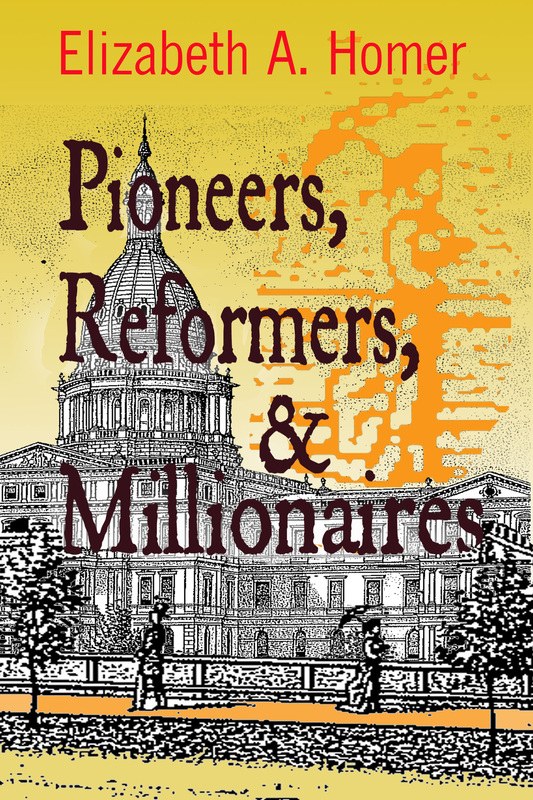By SHEILA SCHIMPF
Capital News Service
LANSING – The quirky thing about local history is its ability to take an unexpected turn as soon as you get yourself deep in the diaries, scrapbooks and newspapers of those who lived before.
Elizabeth Homer, for example, started out to write a history of 19th century Lansing but sometime during the seven years she was immersed in it, she realized she was working on a national story with Shakespearean elements.

Pioneers, Reformers, and Millionaires by Elizabeth Homer
Her new book, “Pioneers, Reformers, & Millionaires,” is filled with abolitionists, railroad titans, a housing bubble, women’s Christian Temperance Unionists, suffragettes, graft, corruption and corporate greed. And Cornelius Vanderbilt.
Homer, 71, of Lansing, considers herself a public historian. By training she is an educator and worked in Lansing as a curator for 20 years, at the Michigan Women’s Historical Center and Hall of Fame and then at the Turner-Dodge House.
“I thought I knew a lot about the Turners and the Dodges,” Homer says. “I did not realize they were true leaders in so many interests of the day. With their friends, they were a real force.’’
They were in the group of progressives that founded the Republican
Party and consistently championed causes such as more education, education for women, abolition, better working conditions for laborers and aid for the poor.
The Turners and the Dodges are the main characters in her book. She tells the story of Lansing through their lives: James Turner and his wife, Marian; her sisters and their husbands; and several of their friends. Homer takes the story through two generations, from 1834 when Lansing was a heavily wooded wilderness through 1912 when Marian died. It was the Turners’ daughter, Abby, who married Frank Dodge.
Marian kept scrapbooks—collections of obituaries and newspaper clippings about important events in Lansing. Homer relied on those as well as writings from the Pioneer Society, early residents who wrote down what they remembered of the Lansing’s first days. Homer is a big believer in primary sources. She lets the people of the time tell Lansing’s story in their own words whenever she can. The long excerpts add a flavor of 19th century language and style to the facts.
Through the deep reading she did in multiple newspapers and annual reports of corporations, Homer found that the corporations took over the railroads and the Republican Party. She is a strong supporter of government regulation because of what happened to Michigan corporations, banks, and liquor industry. Unregulated, all three industries took advantage of the people, she says.
For example, the Turners’ son, James M., ran for governor in the 1890s but the railroad interests kept him out, Homer says. The railroads paid no taxes at the time and fought to keep it that way, buying judges and legislators. Turner built a railroad from Port Huron to Lansing that Cornelius Vanderbilt wanted. Eventually Turner had to sell it to Vanderbilt. “Local companies had no power,” Homer says.
James M. Turner — the son — owned property all over Michigan, including two dozen iron mines up north, Homer says. Many of his papers are kept at the Marquette Regional History Center. “He was beloved in the Upper Peninsula,” she said. “He was very community-oriented and invested in the local communities.” He owned 32,000 acres of lumber, she said.
The pioneers who came by horse cart from western New York through the mud and the tree stumps to build a city out of the Michigan wilderness were educated, progressive thinkers, Homer says. They kept careful records of the things they did and it was possible for her to track their idealism from one generation to the next.
She incorporated their interest in a Female College and in women’s voting rights into the mainstream of the text, possibly due to her own interests and experience at the Michigan Women’s Historical Center.
She also found out about land lookers, people who were sent to that section of every county that was set aside for education to look at it and assess its practicality for a school. John M. Longyear, whose mother was one of Marian Turner’s sisters, was a land agent. He and James M. Turner were cousins, and Longyear also owned a mine in the U.P. The research library at the Marquette Regional History Center is named the J.M. Longyear Research Library.
Homer published her book herself. It is $24.99 at Lansing area bookstores and online at Amazon and Barnes and Noble. It is also sold through elizabethhomer.com. She admits it takes awhile to read but says it gives people a sense of place. “You need to know the story to have a sense of the state,” she says.
The Monroe sisters, Marian Turner and her siblings, used to long for the good old pioneer days of the 1830s and 1840s, she says.
“When wealth was not a big factor,” Homer says. “Everybody was equal, helping each other.”
Resources for Editors:
More information is available at elizabethhomer.com.
Information on the Turner-Dodge House and the people who lived there is at http://www.lansingmi.gov/tdodge